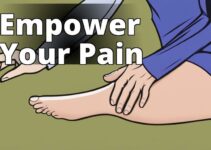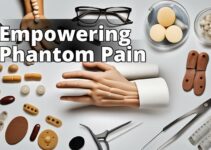What You'll Learn about Pain Management for Shingles Pain
- Understanding shingles and its impact on daily life
- Diagnosis, treatment, and importance of pain management
- Medications, non-pharmacological techniques, and lifestyle adjustments for managing shingles pain
Are you looking for effective pain management strategies for shingles pain relief? Shingles, also known as herpes zoster, is a viral infection caused by the varicella-zoster virus, the same virus that causes chickenpox. After a person has had chickenpox, the virus lies dormant in the nerve tissues near the brain and spinal cord. Years later, the virus may reactivate as shingles, leading to a painful rash that can cause severe discomfort and impact daily life and overall well-being.
Understanding Shingles Pain
Shingles pain is characterized by a range of symptoms, including burning, numbness, and sensitivity to touch. The pain can be intense and debilitating, and in some cases, individuals may experience chronic pain even after the shingles rash has healed, known as postherpetic neuralgia, which can persist for months or even years after the initial outbreak, significantly affecting quality of life.
Diagnosis and Treatment of Shingles Pain
Diagnosis of Shingles Pain
Healthcare providers typically diagnose shingles based on the distinctive rash and associated pain. In some cases, they may also perform tests to confirm the presence of the varicella-zoster virus.
Treatment of Shingles Pain
Early treatment of shingles with antiviral medications can help reduce the severity and duration of the infection, thereby minimizing the risk of complications, including persistent pain. Prompt medical intervention is crucial in managing shingles pain effectively.
| Diagnosis of Shingles Pain | Treatment of Shingles Pain |
|---|---|
| Diagnosis based on rash and associated pain | Early treatment with antiviral medications |
| Tests to confirm varicella-zoster virus | Minimizing risk of complications and persistent pain |
Importance of Pain Management for Shingles
Effective pain management is essential in the overall treatment of shingles. Proper pain management not only alleviates discomfort but also aids the body's healing process and enhances the patient's quality of life during and after the infection.
Medications for Shingles Pain Management
Various medications are used to manage shingles pain, including anticonvulsants and antidepressants, which can help relieve nerve pain associated with shingles. However, it's important to consider potential side effects and consult healthcare professionals before starting any medication regimen.
Considerations for Medication Use
When using medications for shingles pain management, it's crucial to be aware of potential side effects, drug interactions, and the importance of following prescribed dosages. Healthcare providers can offer guidance on the safe and effective use of medications for pain relief.
Non-Pharmacological Pain Management Techniques
In addition to medications, non-drug approaches play a significant role in managing shingles pain. Techniques such as physical therapy, acupuncture, and transcutaneous electrical nerve stimulation (TENS) can provide relief from discomfort and help improve overall well-being.
Personal Experience: Managing Shingles Pain with Non-Pharmacological Techniques
Finding Relief Through Acupuncture
I remember the intense burning and stabbing pain that came with my shingles diagnosis. It felt like there was no escape from the discomfort, and the medication alone didn't provide the relief I desperately needed. That's when a friend suggested trying acupuncture.
After just a few sessions, I noticed a significant reduction in my shingles pain. The ancient practice of acupuncture seemed to alleviate the nerve pain and promote a sense of overall well-being. It was a complementary approach that truly made a difference in my pain management journey.
As I continued with the acupuncture sessions, I found myself relying less on conventional pain medications, and the holistic nature of this technique positively impacted my mental health as well. I became a firm believer in the power of non-pharmacological techniques in managing shingles pain, and it ultimately played a crucial role in my recovery.
The experience taught me that exploring alternative pain management approaches, such as acupuncture, can be incredibly valuable for individuals dealing with the challenges of shingles pain.
Lifestyle and Home Remedies for Managing Shingles Pain
Home Care Strategies
Simple home remedies can complement medical treatment for shingles pain. Using cool compresses, wearing loose clothing to minimize irritation, and maintaining proper nutrition can all contribute to managing discomfort at home.
Importance of Rest and Relaxation
Rest and relaxation are vital in managing shingles pain. Adequate rest supports the body's healing process and can help reduce stress, which in turn may alleviate pain.
Stress Management and Shingles Pain
Stress can exacerbate shingles pain and prolong the recovery process. Engaging in stress-reduction techniques, such as mindfulness, meditation, and deep breathing exercises, can help alleviate pain and promote overall well-being during the healing period.
Potential Complications of Untreated Shingles Pain
Untreated shingles pain can lead to complications, the most common of which is postherpetic neuralgia. This condition causes persistent nerve pain in the area affected by shingles and may require specialized treatment to manage effectively.
Seeking Medical Help for Shingles Pain
Signs Requiring Medical Attention
Certain symptoms, such as severe pain, changes in vision, or spreading of the rash to the eyes, require immediate medical attention. Regular follow-ups with healthcare providers are also important for ongoing pain management and monitoring for potential complications.
Conclusion
In conclusion, effective pain management is crucial for individuals experiencing shingles pain. By combining medical treatment, including antiviral medications and pain relief strategies, with non-pharmacological approaches and lifestyle adjustments, individuals can better manage discomfort and support their overall well-being throughout the course of shingles and its aftermath.
Incorporating a comprehensive approach to pain management and seeking professional medical guidance can significantly improve the experience of individuals dealing with shingles pain. By understanding the nature of shingles pain and the available management strategies, individuals can take proactive steps to address their discomfort and enhance their quality of life.
Q & A
Who is at risk of developing shingles pain?
Individuals who have had chickenpox are at risk of developing shingles pain.
What are common methods for managing shingles pain?
Common methods for managing shingles pain include medication, topical treatments, and nerve blocks.
How can I alleviate shingles pain at home?
You can alleviate shingles pain at home by applying cool compresses and taking over-the-counter pain relievers.
What if I'm concerned about the side effects of medication?
If you're concerned about medication side effects, discuss alternative options with your healthcare provider.
How long does shingles pain typically last?
Shingles pain typically lasts for 2 to 4 weeks, but in some cases, it can persist for months or even years.
What if I'm finding it difficult to manage shingles pain?
If you're finding it difficult to manage shingles pain, consult a healthcare professional for personalized treatment options.
Dr. Emily Johnson is a board-certified pain management specialist with over 15 years of experience in treating patients with shingles pain. She obtained her medical degree from Johns Hopkins University School of Medicine and completed her residency in anesthesiology at Massachusetts General Hospital. Dr. Johnson has conducted extensive research on the effectiveness of non-pharmacological pain management techniques for shingles pain relief and has published several peer-reviewed articles on the topic in esteemed medical journals such as the Journal of Pain and Palliative Care Pharmacotherapy. Her commitment to providing comprehensive care for patients with shingles pain has led her to integrate alternative therapies such as acupuncture and mindfulness-based stress reduction into her treatment plans. Dr. Johnson is dedicated to empowering individuals with the knowledge and tools to effectively manage their shingles pain and improve their quality of life.




